#or from a sort of...self-loathing that recenters white feelings in discussions around race
Explore tagged Tumblr posts
Text
i think maybe the problem with kuang's "yellowface" is that there ISN'T a constructive way to write that kind of story. either you do what she did, and make the white protag a parody of personhood (which further obscures the material and systemic realities of racism in the US, while allowing white readers a sort of...distance from id-ing with a Bad Person). or you write something very subtle, with the understanding that readers and reviewers might totally miss the mark, rendering your "critique" worthless. either you write a popular, obvious satire, or you--idk, don't, i guess. because i'm not entirely sure who this book is FOR. we KNOW whiteness hates us. we KNOW we're the Other. we know how they think about us. and white people based entire (economic, social) systems around antiblack, anti-indigenous hierarchies that profits off our creative labor while denying us personhood. so they're aware, too. no matter how much they pretend ignorance.
#whoops the disc horse#reading practices#like in the moment it felt validating to have someone talk about the ways that whiteness reinvents itself#to profit off nonwhite labor for its own reproduction#but i think a lot of the white reviewers/celebrities now endorsing it#are either approaching this book from a ''well i'm not like this parody so I'M good'' perspective#or from a sort of...self-loathing that recenters white feelings in discussions around race#both of which are not useful#at the same time i don't think it's really kuang's job to offer some kind of...solution#so ultimately for me it comes off as ''yeah...white people are like this. who are you telling this for?''
6 notes
·
View notes
Text
BLOGTOBER 10/24/2018: HEREDITARY
I am not ready to talk about HEREDITARY. I tried it when it came out in June, and while I think I hit all the points that were important for mass audiences, I wasn’t really ready then either, to say what I wanted to say. It isn’t because it’s so unusually beautiful, which it is. It isn’t because it’s “the scariest movie ever made”, which it is not, although it intermittently reaches seldom-seen heights of horror. It also isn’t because, contrary to popular belief, it is deeply flawed, with certain understandable markers of being someone’s first feature. It is because it feels so profoundly personal to me, even while I know that this is a not-uncommon reaction to Ari Aster’s breakout debut. It doesn’t make me special that I would take this film about grief, guilt, mental illness, genetic disorder, and irresolvable family friction so personally, but as usual, I have something I need to say about it. My experience with the movie tells me something, not about why we need HEREDITARY, but why we need art.
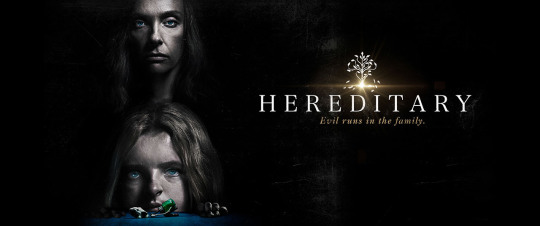
(spoilers abound)
This story, about a woman who recently lost her seriously disturbed mother, and who subsequently loses her also-disturbed daughter to a car wreck caused by her teenage son, has been accused of emotional exploitation by some. HEREDITARY is aggressively harrowing, with interminably protracted suspense, teasingly dense shadows, and a constant unnatural drone that characterizes everything you see, however mundane, as malignantly abnormal. Most audiences may accept this kind of brutality when it is buffered by a fantastical metaphor, as with an EXORCIST or a SHINING. You can scare someone half to death, as long as you reassure them that whatever they’ve seen probably isn’t going to happen to them, even if it reminds them of something that did, or could. If you just make people feel bad, however, they may turn on you. This is Ari Aster’s big mistake, if you want to call it that; I know parents who refuse to watch the movie, due to its infamous scene of violence against a child. It’s easy to see why any reasonable person might want to opt out of this unusually shocking scene, in which young Milly Shapiro is accidentally decapitated while her teenage brother races her to the hospital, after having neglectfully caused her need for a hospital trip in the first place. But, I think it also calls into question the place for and purpose of the artist’s contract with the audience. This concept usually refers to the unspoken promise that a filmmaker makes to his viewers, that whatever happens in the movie, even if it is confrontational, will fall within the bounds of what the viewers basically expect when they buy their tickets. It means something like, when a family-oriented entertainment producer like Disney adapts a Grimm Brothers fairy tale, the audience won’t have to see the huntsman eviscerate an animal to get his ersatz proof that he has killed Snow White, and they won’t have to see Cinderella’s wicked stepsisters mutilate their own feet to try to fit the glass slipper. Part of the problem many people have with HEREDITARY is that Ari Aster’s contract with his audience is a little unclear. It blends psychodrama about irresolvable family issues that can hit way too close to the literal home for any ordinary person, with the unthinkable but entirely doable desecration of the human body, with outrageous supernatural horrors that, while scary as hell, can seem preposterous in light of the more terrestrial torments that have gone before.
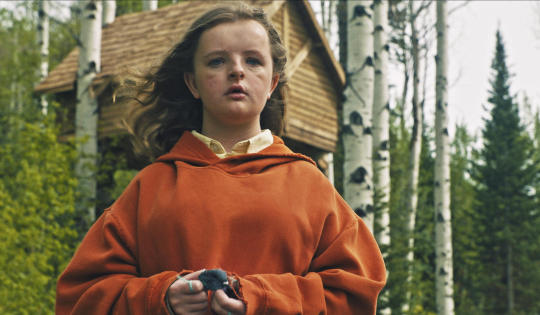
To try to be more succinct, which is difficult with such a complex film, my own problem with HEREDITARY is that it contains metaphors for real-world elements that are already in the movie. To go back to the example of THE EXORCIST: Regan’s transformation from an innocent child into a vile self-abusing demon serves as a ready metaphor for puberty, mental illness, addiction, and really anything that turns your loved one into someone you no longer recognize. Writer Peter Blatty sets this up beautifully by using banal troubles like drafts in the house or parental antagonism as agents that weaken Regan’s defenses against the forces of darkness, just as they can weaken the average person’s defenses against depression or alcoholism--the things that warp them away from their best, or at least, most socially acceptable self. HEREDITARY gets itself into a sticky spot by giving Toni Collete a family history of emotional and physical violence, schizo-affective disorder, alienation, and neglect that is as convincing as can be, and then throwing a comparatively flimsy (however great-looking) metaphorical tarp over all that in the form of witchcraft and demonic possession. A similar problem occurs in Boots Riley’s otherwise excellent SORRY TO BOTHER YOU, where he stages the action in a world--our world, however surreally dressed up--that turns on an axis of slave labor, and then he concludes his story with an outsized metaphor for slave labor. I wouldn’t really kick anything in either of these movies out of bed, at the end of the day; I’m just saying that it gets a little awkward when you craft this grandiose metaphor for a legitimately terrifying real-world thing, while that thing happens to be standing right there in the room with the metaphor.
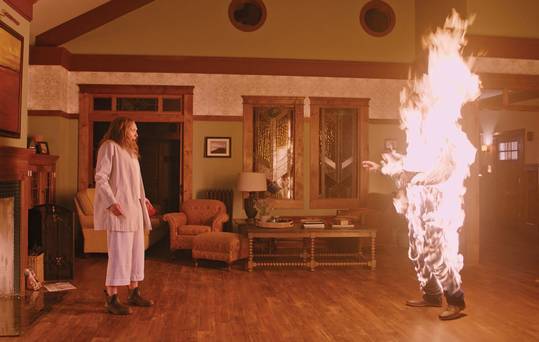
Anyway. It is interesting to note that while the movie seems to have hurt a lot of people’s feelings based on their own contemporary reality, its spiritual DNA has been active for hundreds of years. Witchery has been a handy metaphor for, or even out-and-out "explanation” for, mental illness in women throughout history. (Ok, so it’s been an excuse for LOTS of things that have happened to or around women throughout history, but I only have so much space!) In HEREDITARY, Toni Collette describes her recently deceased mother as being extraordinarily private, having “private rituals” and even “private friends”, which we soon realize were signs of her being a devil worshiper. However, in some ways, mother and daughter are not so different. Where the mother practiced dark arts, Collette is a successful gallery artist. Her hyperreal dioramas seem like metaphorical expressions of her feelings toward her insane and abusive parent, but as we find out along the way, they are entirely realistic descriptions of actual things that have actually happened in her life--including the notorious car crash, but also things like the mother trying to force her breast on her infant granddaughter, which we later learn was part of an effort to implant Milly Shaprio with a demon. Shapiro, who inhabits a Baba Yaga-like treehouse in the yard, is also an artist, crafting twisted-looking dolls out of refuse and carrion, and like her mother, she also has unwitting witchy inclinations, perceiving grim specters and ill omens all around. Notably, no one outside the maternal bloodline perceive these things, and it seems that male members only perceive them when being supernaturally attacked. While Toni Collete and Milly Shapiro both use handcrafted art to process the trauma handed down to them by their maternal ancestor, all three women participate (knowingly or otherwise) in an ancient artistic tradition that, for some, amounts to a legitimate religion--but for many others, especially in the modern world, it is a way of dealing with feelings of impotence and subjugation. A sense of disappointment, worthlessness, and damnation plagues the women at the center of HEREDITARY, whether it involves Toni Collette’s complaint that her family blames her for all of their misfortunes, or her accusing her teenage son Alex Wolff of failing to acknowledge his responsibility for his sister’s death, or his sister ominously remarking that her grandmother’s doting attitude disguised the matriarch’s attempts to control or deform her--”She wanted me to be a boy,” Shapiro mutters, and we’ll find out she specifically wanted the child to be a boy vessel for a boy demon (about which, more later). HEREDITARY depicts a family out of control, who cannot escape the fate that has been devised for them, but who have adopted some interesting, literally artful means of trying to synthesize feelings of power.
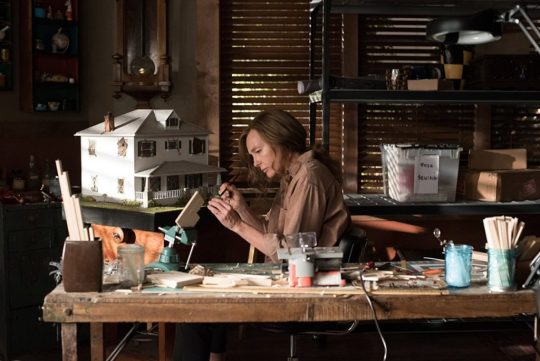
HEREDITARY begins to fall apart, not as much because of its indecisive attitude toward fantasy and realism, as because of its last act left turn away from its heretofore cogent discussion of the disenfranchisement of women, and the guilt women live with when they fall short of their clan’s desires for strong sons, good little girls, or perfect mothers who serve their people instead of serving themselves. Make no mistake: Alex Wolff, who delivers an above-and-beyond performance as an average young man who is alienated by his freak sister and unstable mother, is always at the center of the film. The guilt he acquires from being an unwilling murderer is as potent as anything I think I’ve ever seen in a movie. So, it isn’t that this male experience of disappointing your family, and also feeling victimized by their very existence, is absent from the first leg of the story. It’s that when the film finally tries to make sense of itself, by revealing that Toni Collette’s mother intended to offer one of her male progeny as a vessel for a masculine entity that would bring her great wealth...well, it sort of flies in the face of the psychological depths we’ve plumbed up to that point. For one thing, the movie’s title suggests a singular focus on the intergenerational passing-down of trauma and blame, and the collection of damaged women to whom we’re immediately introduced are obvious experts in this matter. It doesn’t quite work when the story vacillates between sympathizing with these doomed females, and then sympathizing with a young man’s fear and loathing of adult women, who he perceives as irrational and castrating. And how is it possible that the profound mystery surrounding the family’s progressive ruin is rooted in something as shallow as money? I tried to develop a theory that it works as the final insult of any familial loss--that death is incredibly expensive to manage, and inheritance can be just burdensome as it is a blessing--but I don’t know, there’s not enough on the table for me to make a meal out of.
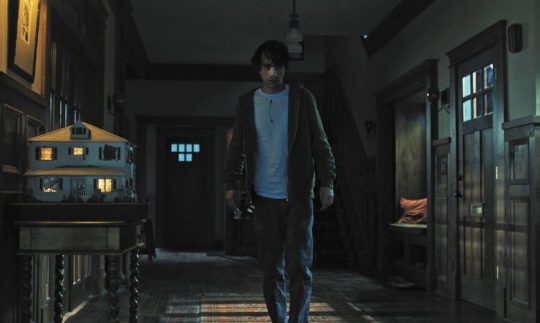
Setting aside the idea of sacrificing your son to a money demon, though, one can say that even if HEREDITARY is a little unsteady in its construction, the individual components are solid. And here I don’t just mean compelling, but also, real. This is the reason I people are so bothered by HEREDITARY--that it tells the truth in a much more direct manner than most audiences expect of a supernatural horror film. While that may be an unwelcome experience, it may be more helpful to think of this unpleasantness as a gift that art can give us. This kind of nasty confrontation with trauma is important for an individual’s personal development, integrity, and self-knowledge. The more demandingly exhibitionistic a movie is, the better chance we have to untangle ourselves from the billowing curtain of metaphor and anthropological generality, and to be purified by the excoriating light of realism--not the artistic genre, but actual contact with reality.
Here we find my own big reveal, my left turn away from what my previous paragraphs have led you to expect. Let me tell you about my mother. My mother was an enormously popular person. Extremely sharp, funny, fashionable, cultured--all things that help keep one’s private persona in the shadows. A prolific artist, she created hyperreal paintings and drawings from miniatures, like toys and model train props, that represented an exaggerated simulation of reality. Much of her work was about female pageantry, social expectations of women, or the chintzy objects that littered the lives of 1950s and 60s housewives, like kitschy bric-a-brac and tawdry paperbacks. People absolutely loved her for her taste, her humor, her ability to express herself. She did not like me. This was so true that, even without a history of physical abuse, that her peers sometimes say things to me that reveal their awareness of the facts of our relationship, or lack thereof. I hear things like, “Your mother loved you, you know!”, in a tone of voice that suggests that they know this would be late breaking news, without ever having asked me how I feel or what I think. From the earliest age, I seemed to refuse to meet the expectations people have of their children: I hated to be touched, I cried endlessly, I quaked with anxiety and a nameless guilt day and night, I burned with an aimless anger. I could draw, and did so compulsively, but nothing nice or bright. I was acutely aware of sexuality, violence, vanity, and shame. I was no fun whatsoever. Later in life--very recently in life, actually--I discovered that I have two important, inherent qualities: One, that I have a genetic inability to process copper properly, a mineral that is psychoactive and can make you pretty unhinged in large quantities. Two, that I suffer from a form of Autism Spectrum Disorder, a range of mental conditions that have been historically ignored in women, largely because of misogynist prejudices that society holds about essentially-female dysfunctionality. Unfortunately for me, my mother died when I was a teenager, almost two decades before I would find out these things that might have made her more tolerant of me.

Fortunately, I guess, I think I know why my mother took such an exception to me, and it isn’t all about me. It’s about her mother. My maternal grandmother was also an artist of sorts, but more in terms of artifice. I haven’t decided whether it is fair for me to spill all of the details of a story that belongs to more people than myself, but I will go so far as to say that my maternal great-grandparents meted out trauma and shame in a manner that my grandmother allowed to contribute to her painful estrangement from her sister. For my purposes, what it really did was teach my mother that darkness--any kind of darkness, even darkness that belongs to you and you alone, that you have a right to, that should be yours to process as you see fit--is inappropriate. It is just as inappropriate in adults as it is in children, which she would see very clearly in her mother’s strict orchestration of their household into an unimpeachably pure, Rockwellian model of what an American family should be like. While my mother found her way into the revolutionary world of hippie rebellion and art-making, she never let go of her prohibition against sadness and rage, even in her own child, and I suffered from it until she suddenly, rapidly and gruesomely died of lung cancer when I was barely old enough to drive. Afterward, her mother obsessed over me in a way that was simultaneously scathingly intense and unmistakably impersonal. I looked like my mother, and my grandmother’s identity was rooted entirely in dominating a family, so she couldn’t do without me. I couldn’t let her know anything about myself; my feelings about horror, pornography, death taboos, sexual identity, and media that is out to hurt you, are what make up all that I am, and are the opposite of everything she believes in. With that weight on my back, I had to pretend that we had this archetypal American familial intimacy, even when I didn’t have it with my own mother, even when I hated being touched, even when I hadn’t learned how to receive affection. Early this year, she died at 90 years old from a misdiagnosed colon condition. As my family rushed to her side to say goodbye, we discovered that her shadowy sister had pushed her doctors into lifesaving measures that would have extended her existence into something so horrific that it would have stood up to the ugliest scenes from JACOB’S LADDER, had she not miraculously died before regaining consciousness. As perversely relieving as that was, my ears ring with the sound of her last phone call to me. Intended to be a heartfelt goodbye, it devolved quickly into the woman, completely possessed of her mental faculties, absolutely screaming for her life. It was a sound as chilling as anything from any of the sadistic movies I love so well, and I really heard it, in my real life.

This all would be enough to make me talk the way that I do, but it isn’t all. Recently, my father revealed to me some details of my mother’s struggle with cancer that I had never heard before. Although my mother had been told to go straight home and make her peace upon diagnosis, she and my father plunged full bore into magical thinking. They experimented with hypnosis, acupuncture, reiki, anything that might activate my mother’s internal ability to heal herself. Soon they found themselves in the office of a charismatic self-help guru-type in a neighboring city. Incidentally, this person is now at the center of an increasingly bizarre trial that is slated to begin this January, due to her authoritative involvement with a Scientology-like cult that allegedly maintains a secret inner circle of brand-wielding sex slavers. But anyway, back to my little memoir: It isn’t clear to me what she claimed was the scope of her powers exactly, but I know that she specialized in a form of “healing” that involved hypnosis and carefully selected words, I suppose not unlike a magical incantation. She said to my mother: “I am going to heal you.” The reason she said this so forcefully, was that my mother was the physical double of a previous client of hers; a client who died from the same specific form of lung cancer that plagued my mother; and who lived in the house we had moved into, only months before my mother was diagnosed with terminal cancer. That woman died, we moved into her house, and by pure coincidence, my subsequently sick mother found herself in the office of the self-styled healer who had treated the previous owner of our new home for the very same illness. “God has given me a second chance,” the healer said, “and I am going to heal you.” My mother saw her for several months, until one day she arrived to find a third woman in the office. Astoundingly, the healer described the young coed as having supernatural gifts. The two instantly began terrorizing my mother, screaming at her and cursing her. My mother, sobbing hysterically, begged to know, “Why are you yelling at me?” and they replied, “WE’RE NOT YELLING AT YOU, WE’RE YELLING AT THE CANCER!” When he told the story, of course, my father accidentally said “demon”, not “cancer”, but in any case, they were trying to exorcize her. My mother never went back, and, some might remark, she died.
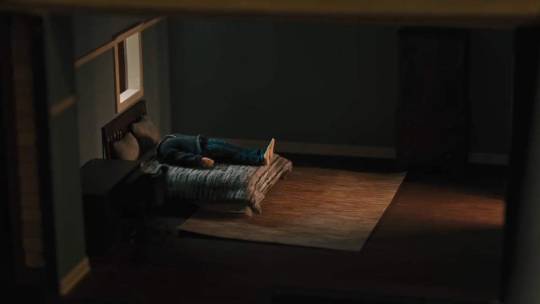
Naturally, I wanted to tell this story to anyone who would listen to me, as soon as I had heard it. It was one of the weirdest things I had ever heard, and it happened to my family. While some people’s jaw dropped in exactly the way mine had originally, I received some unexpected feedback, too. On some occasions, a dear friend would pause at the end of my story, make a calculated “surprise” sound, and then, very gently, explain to me that coincidences exist, self-hypnosis and group hysteria exist, and I shouldn’t take any of it too seriously. I found myself, not just disappointed, but embarrassed. I wasn’t trying to tell people that I believed my family was cursed by god or the devil, or that we had been molested by some evil sorceress. I was simply trying to say that, somehow...isn’t there some kind of spiritual truth to this? Isn’t it worth remarking on, that my life, my history, had congealed into such an incredible metaphor for itself? Isn’t it so much more compelling than any kind of fiction I could ever have written, any artwork I could ever have created in order to process the exact kind of trouble my family has suffered? Isn’t this just amazing, all by itself, without even the benefit of theatrical interpretation? Of course, the conclusion will be that I absolutely have to give this some kind of theatrical interpretation, or else I will go out of my mind. I’m close enough as it is. But, in some ways, I felt like this interpretation has already happened at the hands of Ari Aster, with his horrific fable about how inherited trauma among generations of women gives way to the machinations of a corrupt cult. People who know me well will realize that I’m still leaving out parallels between HEREDITARY and myself, in this already too-long piece of analysis. But I guess what I’m trying to say for now is that I need HEREDITARY, and we each need a HEREDITARY of our own to put our most unspeakable experiences on a pin, under a spotlight, inside a bell jar, to be examined from every angle and exactingly diagnosed, whether we like it or not.
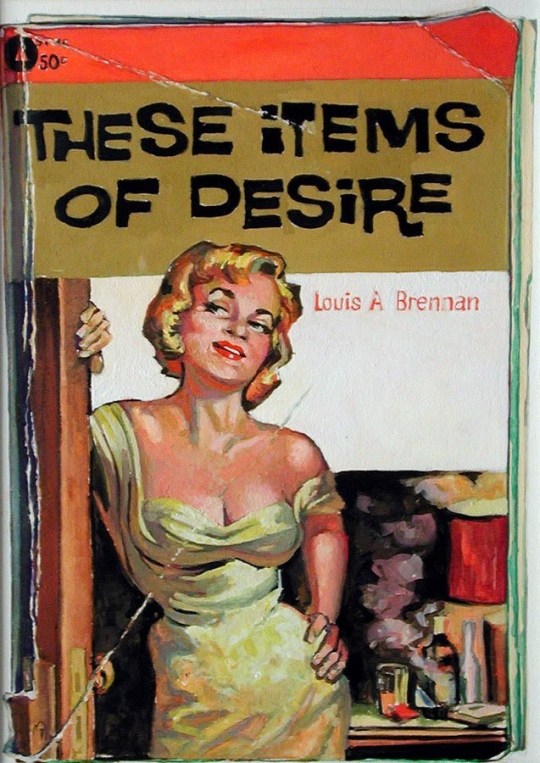

#blogtober#hereditary#ari aster#horror#supernatural#witch#cult#toni collette#milly shapiro#alex wolff#gabriel byrne#anecdotal evidence#mental illness
74 notes
·
View notes